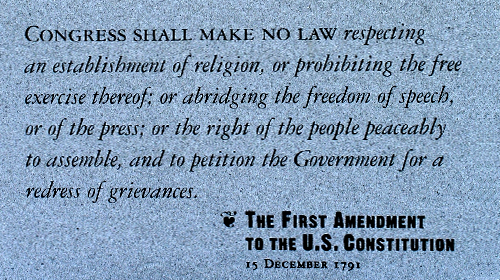
A week after the Department of Justice notified the Associated Press that it had secretly seized records for more than 20 phone lines in a leak investigation, an overlooked search warrant in another leak case that raises similar ÔÇô and perhaps more serious ÔÇô constitutional concerns.
The Post reported that in 2010, an FBI counterespionage agent obtained a sealed search warrant for access to the Gmail account of James Rosen, Fox News's chief Washington correspondent. The agent also pulled records from the State Department showing Rosen's comings and goings, as well as telephone records showing phone numbers, times, and durations of calls. The various records and emails were sought as part of a leak investigation into a June 2009 story Rosen wrote reporting that North Korea would conduct a nuclear test in response to a critical United Nations resolution.
Stephen Kim, an analyst with the Lawrence Livermore National Laboratory, is now under indictment for that leak. He has pled not guilty, and his case is one of the six ongoing leak investigations under the Obama administration (twice as many cases as have ever been prosecuted under all previous administrations combined).
The warrant application was unsealed back in November 2011, but it's only with the controversy swirling around the administration's uniquely aggressive stance on national security leaks to the media that the Post discovered and reported on the Fox investigation.
There are a couple of angles here that make the Rosen warrant unique and uniquely troubling.
In recognition of the special status of news gathering under the First Amendment, a federal lawÔÇöthe Privacy Protection ActÔÇöbars federal investigators from demanding materials from reporters unless there is probable cause to believe that the reporter himself has committed a crime. That's exactly what the FBI claimed hereÔÇöthat "Reporter has committed or is committing a violation of [the Espionage Act], as an aider and abettor and/or co-conspirator." (The Espionage Act is the primary statute used to target "leaks," and bars the unauthorized disclosure of classified information if the person doing the disclosing has reason to know disclosure could harm the United States).
What's astonishing here is that never before has the government argued that newsgatheringÔÇöin this case, asking a source to provide sensitive informationÔÇöis itself illegal. That would, quite literally, make virtually any question by a reporter implicating classified information a potential felony. The logic behind the FBI's warrant application would extend even to a reporter asking a question at a public press briefing at the CIA, Pentagon, or State Department. If the question is designed to elicit the disclosure of classified information, and prompts that disclosure, I don't see how the reporter couldn't be held responsible under the FBI's rationale.
Additionally, the FBI was able to keep the existence of the warrant secret from Rosen because it argued he'd committed a crime. That's similar to what happened with the AP, where the Department of Justice presumably invoked the exception to the notice requirement under DOJ guidelines, which allow for delay when notice could imperil the investigation. However, the delay provision is extremely strong medicine, because delaying notice means that the news outlet is unable to go to a court to challenge the request before the records are turned over. Consequently, the delay provision opens the door to significant abuse, as government agents have an incentive to delay notice because it allows them to avoid going in front of a judge to justify their request.
Walter Pincus, the defense and intelligence correspondent at The Washington Post, had a this morning somewhat critical of First Amendment advocates expressing concern with the AP leaks investigation. He concludes, "[t]he reality is that this is not a whistleblowing case. There are no heroes here, and the press in this instance was not protecting individuals trying to expose government malfeasance."
But that's missing the point. Classified information is "leaked" every day, sometimes for partisan benefit and sometimes as part of the grand game of bureaucracies in Washington. But, just as we abide "bad" speech to give "good" speech "breathing room" under free speech law, we grant the press special protections from government scrutiny to provide ample space for the press to act "badly" to ensure information in the public interest, even if classified, has the best chance of being disclosed.
In other words, the particulars of the AP and Rosen cases are almost immaterial. The fundamental issue is that the government has lost a sense of proportion in enforcing our national security laws, and that should be of enormous concern to us all.
Update: The seventh paragraph of this blog has been revised slightly to better reflect the governmentÔÇÖs allegations in the Rosen case. The affidavit does not allege that Rosen merely asked Kim to comment on a story already written. Rather, the government argues that Rosen implored Kim to turn over sensitive information. This is nevertheless still of great concern, because it means that any media request for information that could qualify or contain "national defense information" could itself constitute a violation of the Espionage Act.
Learn more about freedom of the press and other civil liberty issues: Sign up for breaking news alerts, , and .

